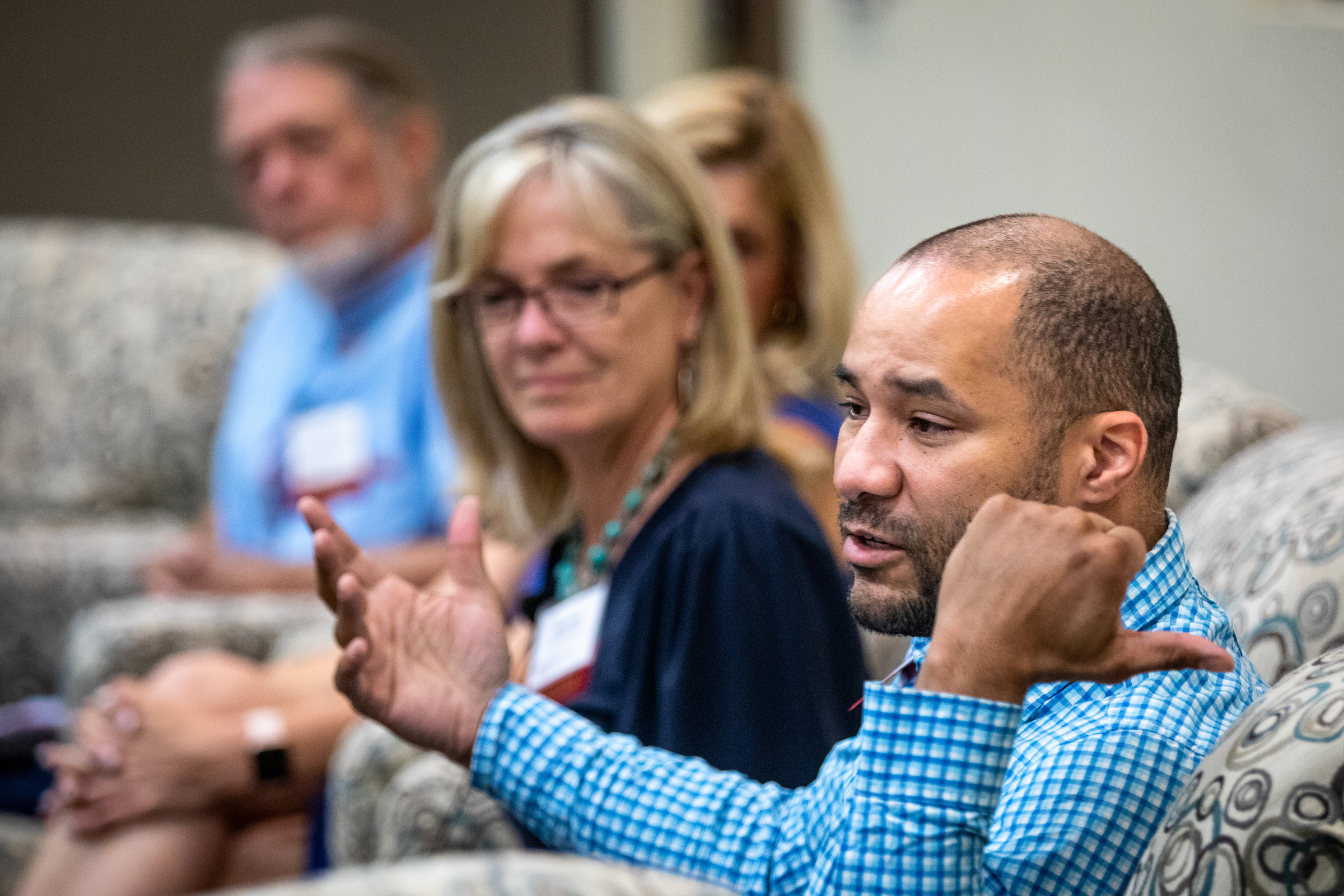Schools, communities tackling food insecurity but policy changes needed, experts say
ASU forum on family nutrition in South Phoenix highlights complex issue
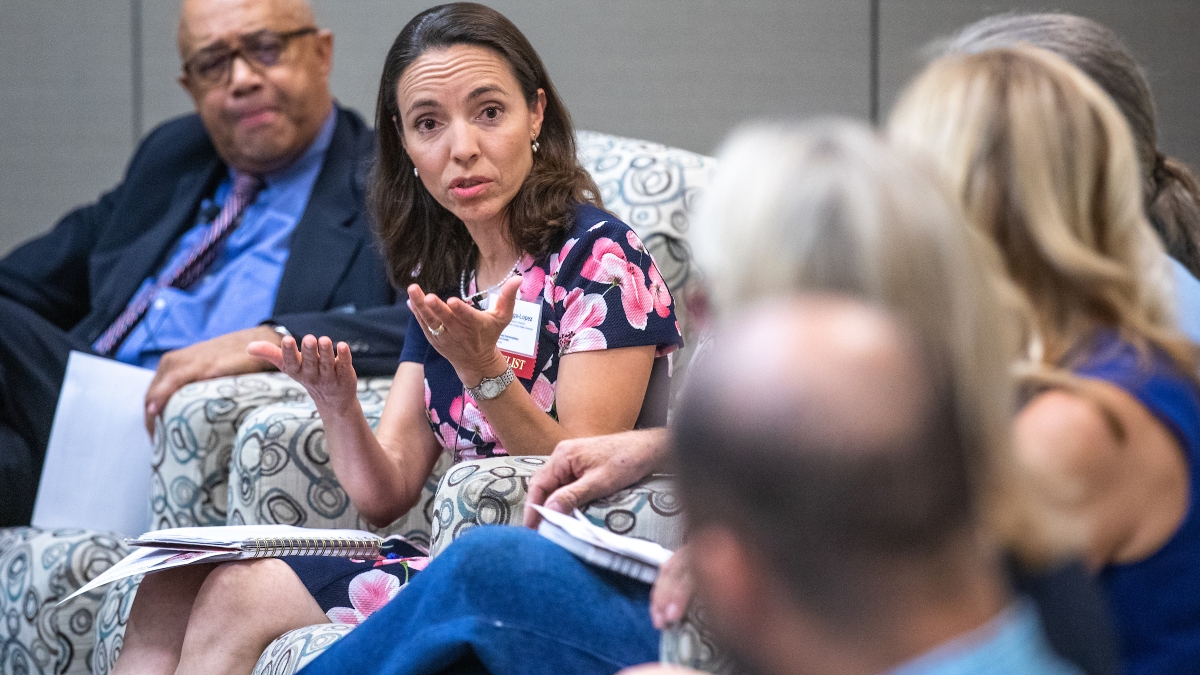
Improving the quality of food for families in South Phoenix will likely require many changes, ranging from policy updates at the federal level to a stronger focus on culture at the family level, according to a group of experts who tackled the issue last week.
“Feeding Families” was a panel discussion sponsored by the Southwest Interdisciplinary Research Center at Arizona State University, which held the event at the Verna McClain Wellness Center in South Phoenix.
The Southwest Interdisciplinary Research Center has federal funding to study health disparities and how research can be applied to directly help communities, according to James Herbert Williams, interim executive director of the center, which is part of the Watts College of Public Service and Community Solutions.
“One thing we work at very hard is trying to understand what a community needs to address — and to be empowered to solve — problems,” said Williams, who is the Arizona Centennial Professor of Social Welfare Services. “We decided to come to South Phoenix so we can hear from you.”
Here’s what the experts said about food insecurity and nutrition:
Working with families
Sonia Vega-López, associate professor of nutrition, College of Health Solutions, ASU: I’ve been focusing on Hispanic families and how to promote healthy eating for prevention of chronic diseases, specifically on how to change behavior. A lot of people say, “You need to educate,” but we know that’s not enough to make people make better choices on what to buy, cook and eat.
Our approach in recent years has been to focus on families, not individuals, and to look at factors to motivate people to change not only for themselves, but for other members of their families.
Lawrence Robinson, president of the governing board of the Roosevelt School District, described programs in his schools that include gardening, cooking and nutrition at the "Feeding Families" forum on Thursday. Photo by Charlie Leight/ASU Now
The pleasure of eating
Vega-López: I’ve been thinking about diet quality, not just food insecurity. We’ve been very good at getting the public very confused about what we shouldn’t eat. We’re starting to talk about whole foods and utilizing foods from farms and preparing more meals from scratch. We’re using simpler messages and focusing on the pleasure of food.
Lawrence Robinson, director of Leadership for Educational Equity and governing board president of the Roosevelt School District: We shouldn’t talk about food without saying that it’s delicious and people enjoy it. With food comes culture. At Lassen Elementary School, we gave the students a task to take one ingredient and go home and talk to their families about it. By the end of the project, they learned not only how to grow and cook and consume that ingredient but how it related to their families.
Then we had a dinner with all that produce. We shared the dinner together, and the kids shared their stories. People came together and were fed. They learned responsibility. And all of that made them healthier. If you cook it, they will come and hopefully it will transform the academic outcomes in our district.
Food and culture
Vega-López: We forget that traditional foods include a lot of healthy foods. A traditional Mexican diet is not what you see on the list of items at a Mexican restaurant. They eat a lot of fruits and vegetables and fish.
We can tell people that those are the foods they already know how to cook and they don’t need to invent new meals. They need to go back to their roots.
Robinson: This area is now a food desert, but I remember as a kid picking collard greens, with miles of fresh produce tended by African American families. You have the neighborhood that had the fresh food that now has obesity and diabetes and is deemed a food desert.
It’s now the policy of land use to wipe out the healthy, safe neighborhood culture that was just here a minute ago.
Shifting the conversation
John Wann-Ángeles, founding director of the Orchard Community Learning Center, a farm and educational organization based in South Phoenix: I’ve read about the "100 things we can do to reverse global warming." A plant-rich diet is No. 4 on the list, and we know a plant-based diet is the only one proven to reverse heart disease.
Why aren’t these questions at the center of school curriculum, not as add-ons? If this were the center of curriculum, a generation could change this conversation.
Federal policy effects
Angie Rodgers, president and CEO of the Association of Arizona Food Banks, which serves 450,000 people per month: We have to recognize the role of the federal government. SNAPThe Supplemental Nutrition Assistance Program, a federal program that provides nutrition benefits to supplement the food budget of needy families. feeds more than a million families but the benefits are so low, about $230 a month, that your choices are based on your pocketbook and not on what’s appropriate.
There are constant discussions about who should be able to buy what types of food, but until they raise the amount that allows it to be a true choice, we shouldn’t have conversations about restricting SNAP choices.
If you go into our food banks now you’ll find the result of the trade war — food the growers were unable to sell to governments like China, which includes pork and a significant amount of all dairy products. We’re thankful for the food. But we’ve received 24 million pounds of pork and dairy in the last eight months, and now you’ve changed the expectations and the palate of the clientele. Could we do that with fresh fruits and vegetables? We absolutely could.
Linda Rider, director of nutrition services at Tempe Elementary School District: The policy changed about 10 years ago to require more whole-grain foods. The current administration has taken a step back, and that’s frustrating because we work hard to make sure we have the right foods. We had that extra 6 cents in reimbursements for healthy foods, and when you take a step back, it will allow them to take back that reimbursement.
Feeding children in school
Rider: We’re in the process of putting salad bars in the serving line because of research we did with ASU. One of their great findings was that when you put salad bars in the serving line versus outside the line, kids will take more fruits and vegetables and actually eat them. When it’s outside the line, they already have their food and are too interested in talking to their friends.
Robinson: Getting farm to table is extremely hard for schools. You have to certify all the health and safety processes. And we’re required to accept the lowest bidder so we can’t buy locally sourced food if it’s not the lowest bid.
Top image: Sonia Vega-López, associate professor of nutrition in the College of Health Solutions at ASU, makes a point at the "Feeding Families" forum held by the Southwest Interdisciplinary Research Center in South Phoenix on May 2. Photo by Charlie Leight/ASU Now
More Health and medicine
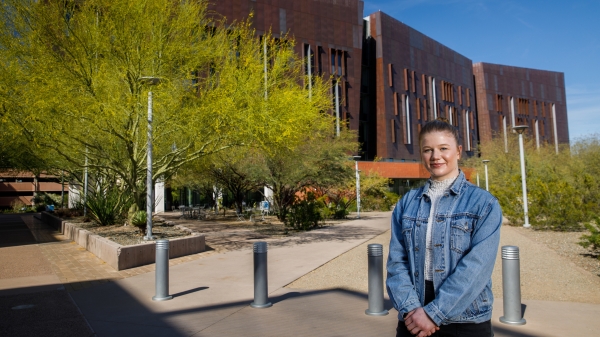
First exchange student for Biodesign Institute Europe bridges labs 5,000 miles apart
This spring semester, Grace Colley traveled to Arizona State University and became the first student to participate in the Biodesign Institute Europe student exchange program. In doing so, she helped…
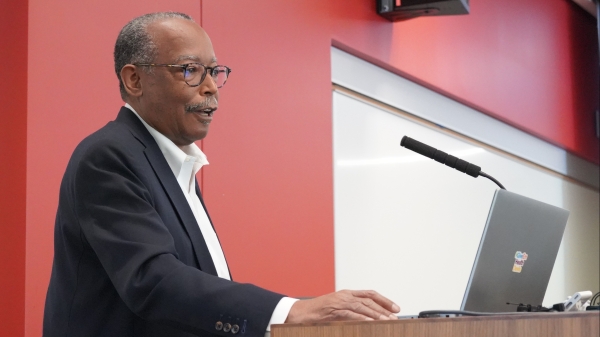
College of Health Solutions hosts visit from leading expert in genomic research
Some fortunate Arizona State University faculty, staff and students were able to gain valuable insights and perspective during a visit by one of the country’s leading figures in health and scientific…
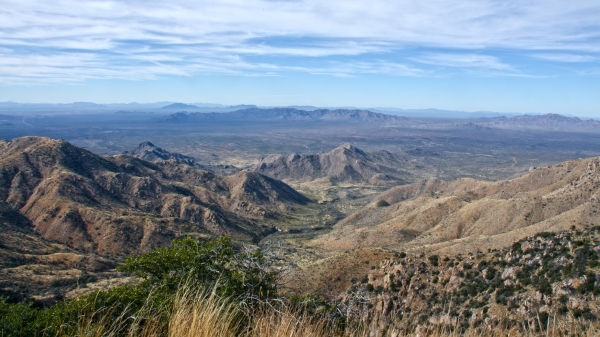
Indigenous ASU research team recommends assistance for tribal members still reeling from COVID-19’s effects
When Matt Ignacio’s tribe, the Tohono O’odham Nation, donated $1 million to Arizona State University to support COVID-19 research, he applied for some of the money to understand and report any…
